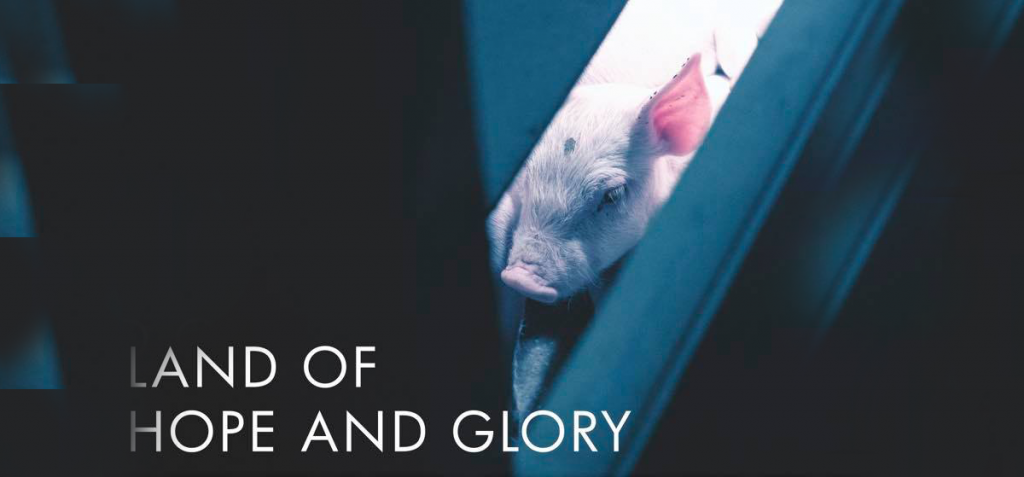Yesterday saw the release of new British documentary, ‘Land of Hope and Glory”; a 48 minute piece of exposé cinema created by UK animal rights organization, Surge.
LOH&G has been touted as a British version of “Earthlings”, the most pivotal undercover documentary of the animal rights movement. Earthlings is pieced together with a montage of secret footage from the States, exposing the graphic exploitation of animals in a variety of industries such as agriculture, the fur and leather trade and entertainment.
Ed Winters, co-founder of Surge explained that one of his reasons for creating the film was to “set the record straight” because whilst those who have seen Earthlings don’t necessarily deny the barbarity, many people in the UK simply do not believe it happens this way in their country.
Welcoming us into the opening scene, Ed narrates over footage of picturesque British farmland and free roaming cows.
“Be aware”

Unveiling UK farming as we have never seen it before, Land of Hope and Glory is comprised of the most up to date investigations as well as never before seen footage across 100 UK facilities. The film is categorized into 5 sections.
PIGS | COWS | BIRDS | EGGS | SHEEP
No matter whether you have seen similar kind of footage or not, this type of thing never gets easier to watch. Exploring the living conditions of pigs first, it is almost an understatement to call it squalor.
There are around 11,000 pig farms in the UK; 1,400 of which house more than 1,000 pigs per unit and around 85% of the total UK pig population. From half cannibalized piglets to maggot infested, swollen sows, we see dead animals surrounded by their diseased crate-mates – this place looks and sounds like the depths of hell, not somewhere you would envisage food coming from.
We learn that one of the ‘humane’ the methods of slaughter for pigs in the UK is by gas chamber and is supported by major supermarkets such as Tesco, ASDA, Sainsbury’s, Lidl and Waitrose.
1/3 of pigs are killed this way while the rest go through electrical stunning, with 1.8 million pigs regaining consciousness on the production line as they die from blood loss.
One could argue that this is not a documentary for the faint of heart, however the pain of the voyeur is not comparable to that of those suffering for our tastebuds. And wouldn’t we want to know that we were participating in the funding of such heinous acts?
Watching on as the pigs writhe in their own excrement with heavy pus-filled tumours and open, infected lacerations is tough to swallow, no matter your current lifestyle choice.
The film follows through explaining the standard practices of each industry and debunking many common myths around their production.

We learn that the true cost of a pint of cow’s milk is not just 49p – it is repeated sexual exploitation of female cows until she is too exhausted or unfit to work; 150,000 of which are slaughtered whilst still pregnant each year.
We learn that her babies will either be put through the same profiteering as her mom, shot and discarded as waste and sold for an early slaughter to the veal industry.
When it comes to birds, it’s revealed that among chickens, turkeys and ducks, an estimated 8.4 million birds are boiled alive each year with at least 90-95% of all bird-meat coming from intensive, windowless factory farms.
Male chicks are useless to the egg industry, meaning that around 40 million chicks are thrown into macerators and ground up alive, immediately after birth.
And finally, sheep – sheep are most commonly stunned using electrical prongs to render them unconscious and as many as 4 million sheep are estimated to be conscious each year whilst they are having their throats slit.

This documentary was put together not for shock value, but rather with the aim to finally reveal the truth behind the UK’s animal agriculture industries and put the myth of happy cows on perfect green pastures to bed. Regardless of where the animal has been raised, it is worth noting that each will end up in the same slaughterhouse and therefore endure the very same method of killing as their factory farmed friends.
As quoted at the end of the film, “The question is not, “can they reason?” nor, “can they talk?” but “can they suffer?” – Jeremy Bentham.
No longer can we say “but it doesn’t happen here”.
You can watch the documentary here, and show your support by sharing the film, hosting a screening or donate to support the ongoing work of Surge.
If you were affected by this documentary and have decided to move towards veganism, please see our resource section which is full of practical tips and advice designed to help you transition.


